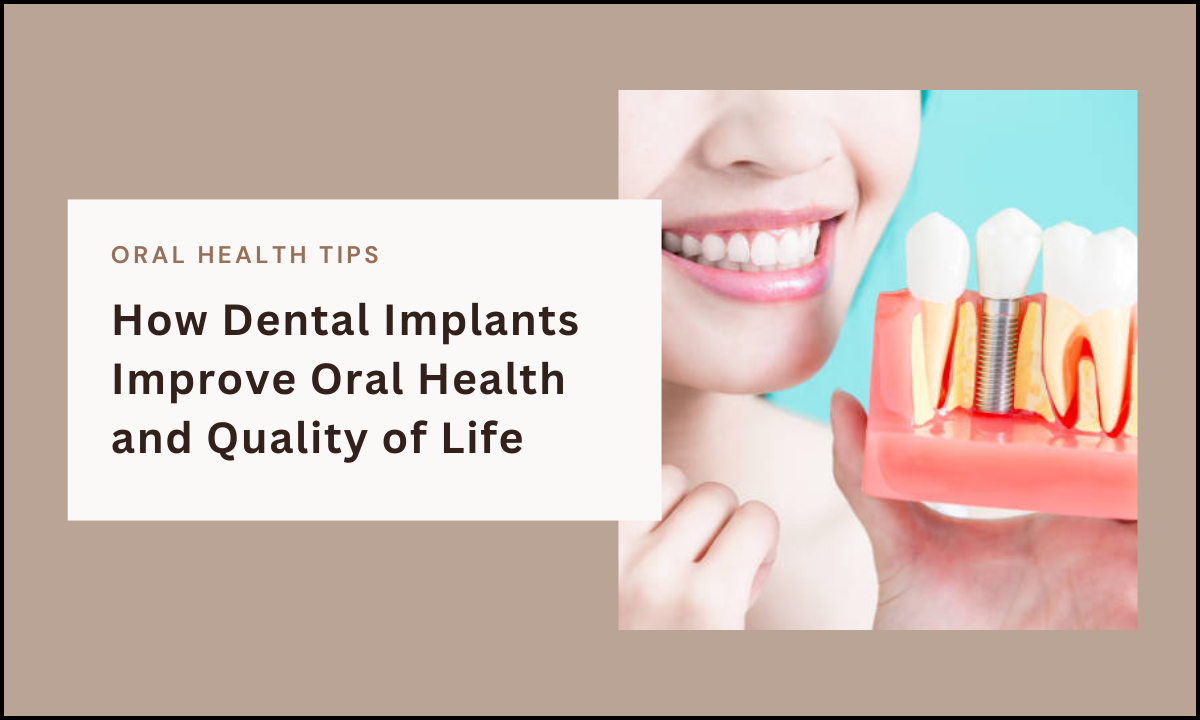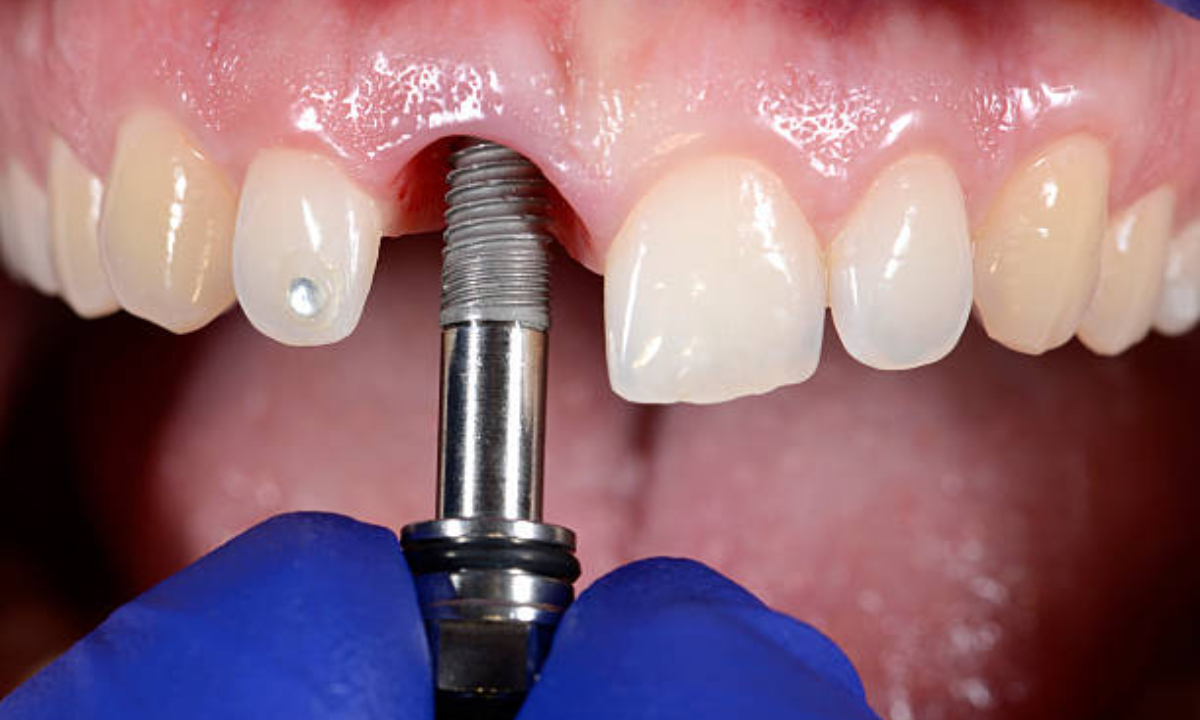A glowing smile doesn’t only talk about beauty but epitomizes confidence and general well-being. To an individual who has lost a tooth or two, this doesn’t only manifest in his or her face but may lead to a further setback of deterioration of oral health, communication skills, dietary, and personal confidence. So, dental implants have developed as the revolutionary part of modern dentistry that provides an exceptionally hard-wearing and successful restoration of both aesthetic aspects of a smile as well as functionality.
Unlike traditional dentures or bridges, dental implant placement involves the fixation of titanium posts within the jaw to provide a solid foundation for the prosthetic tooth. It is not just about filling the gap created by missing teeth but also about the possibility of long-term oral health with the shape and structure of teeth. This blog discusses the various benefits that result from dental implants and how they improve oral health and the quality of life of patients.
What Are Dental Implants?
Dental implants are artificial tooth roots manufactured using biocompatible materials, mainly titanium, which are surgically inserted into the jawbone to allow for support for a prosthetic tooth or bridge. This procedure is divided into three basic components:
- Implant: It is the titanium post that integrates itself with the jawbone through the process of osseointegration.
- Abutment: It’s a connector placed over the implant holding the prosthetic tooth in position.
- The Prosthetic Tooth: This is the part of the implant that is visible and intended to be like the natural teeth in color, shape, and size.
Dental Implant Placement Process
- Initial Consultation and Planning: This process begins with a comprehensive dental examination, involving X-rays and 3D imaging, to determine if the patient has sufficient bone density for implants.
- Minimal surgery is when an implant is placed in the jawbone under local or general anesthesia and it might take a few weeks to months of healing time before the implant can be combined with the bone.
- Attachment of the abutment: Once an implant has firmly integrated into the jawbone, then an abutment will be attached to it.
- Final restoration: A custom-designed crown will be placed over the abutment.
Advantages of Dental Implants
Dental implants provide many benefits for long-term dental health:
1. Prevention of Bone Loss
The most significant advantage of dental implants is the prevention of bone loss. After losing a tooth, the underlying jawbone begins to deteriorate because of the lack of stimulation. Dental implants provide the needed stimulation to keep the bone density intact, thus preventing resorption.
2. Effective Chewing and Digestion
Missing teeth interfere with proper chewing and lead to inadequate digestion and dietary restrictions. The dental implants can restore full chewing power, meaning that patients can eat any balanced diet consisting of hard or crunchy foods like nuts and raw vegetables.
3. Protection for the Surrounding Teeth
Traditional bridges are supported by adjacent teeth. In most cases, these teeth have to be reduced or filed down. Dental implants, however, are self-supporting. They do not compromise the integrity of adjacent teeth, keeping them in their natural state.
4. Better Oral Hygiene
Dental implants make oral hygiene easier to maintain compared to dentures or bridges. They are treated like natural teeth, brushed, flossed, and visited the dentist regularly, thereby minimizing the chance of gum disease and other oral health problems.
Enhancing Quality of Life through Dental Implants
1. Regained Confidence
Dental implants can make an individual nearly as attractive in terms of a smile as real natural teeth. This aesthetic boost is considerably enhanced in promoting self-confidence, and consequently, individuals smile without constraints and freely socialize without hesitation.
2. Improvement in Speaking
Bad speech is due to loss of natural teeth or ill-fitting dentures. Dental implants are helpful in the proper articulation of words due to a strong base.
3. Long Lasting and Durable
Dental implants are designed and made to last a lifetime if properly cared for. The durability eliminates the nuisance and cost of requiring to change them often and offers permanent tooth loss rehabilitation.
4. Comfort and Convenience
Dental implants become a fixture in the mouth. Since they stay fixed, the discomfort and instability of loose dentures are eliminated. Patients appreciate a natural sensation and functioning that could complement daily life well.
5. Freedom to Eat and Drink
Dental implants are firmly held in place, and patients can enjoy all their favorite foods without worrying about slippage or damage. This freedom contributes to a better quality of life overall.
The Psychological Impact of Dental Implants
Other than smile beautification, there are other physical improvements that dental implants bring. Restoration of a complete set of teeth has psychological impacts; one overcomes the psychological challenges brought about by tooth loss. A person’s social confidence is enhanced, and anxiety in professional settings is reduced as a whole because of the restored smile.
Dental Implants Care
Maintaining dental implants is simple but necessary for them to stay long. Important actions to ensure these implants remain healthy include:
- Brush and floss daily: Use an ultra-soft bristled toothbrush and nonabrasive toothpaste to clean implants. Flossing around the implant is very important, not only for eliminating debris but also for preventing gum disease.
- You should visit your dentist every six months for a professional cleaning and an inspection of the implant.
- Smoking: This will impair healing and chances increase for an implant failure
- Protect Against Grinding: If you grind, then seek your dentist for the implant. You could then consider having a night guard used to protect the implant.
Who can get dental implants?
Though a dental implant can be the perfect solution for most people, it is not possible for everyone. General health, gum health, and enough jawbone density all play a role in determining candidacy. Certain medical conditions, such as uncontrolled diabetes or smoking heavily, might require extra evaluation.
Cost Considerations and Value
Dental implants may be more costly compared to restoratives. However, its durability and benefits negate the price tag. Improved oral health with time reduces the expenses in terms of dental procedures, which goes on to lead to a quality life.
Conclusion
Dental implants are the most unbelievable advancement in dentistry that offers benefits unparalleled to oral health and total quality of life. From preventing bone loss to giving confidence, the placement of dental implants offers a holistic solution to people suffering from tooth loss. Because they closely resemble the function and look of natural teeth, implants make sure that people can enjoy all the pleasures in life eating and speaking to smiling with confidence.
Dental implants can last throughout one’s life if they take good care and maintenance of them. Which means that it is an investment in health, and happiness, too. When you are interested in getting dental implants, go to a dentist in Whitefield, you can trust and find out exactly how these could transform your life as far as your mouth goes.


